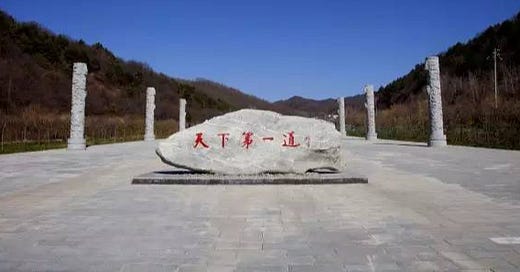This post was spurred by a note from James Ford discussing a purported Rumi quote, “As you start to walk on the way, the way appears.”
Many spiritual traditions speak of following a path. This is especially true of the teachings of Daoism as we follow “the Great Way.” Matching the Rumi saying, the Zhuangzi says, “A path is made by walking.” (道行之而成) This was also echoed by the Spanish poet Antonio Machado some two thousand years later, “Traveler, there is no path, the path is made by walking it.” As Daoists we follow the path trod by those who have come before us and we also walk arm in arm with our fellow “wayfarers”, our spiritual siblings following the same path. We could also read the Zhuangzi quote as, “The Dao is accomplished by practicing it.”
The path is a useful framework for self-cultivation, but it can also become an impediment if we take the path as being something too straight and narrow that we can easily stray from. The path is not a razor’s edge, a tightrope, or a high-wire act. The Dao is perfect just as it is, with nothing lacking and nothing in excess. We can no more stray from the path in its widest sense than we can fall off the Earth. This isn’t something to worry about, unless perhaps you are a Flat Earther! As Lu Xisheng said in his commentary on the Daode Jing, “The great way is like a broad avenue. A broad avenue is smooth and easy to travel on, and no one can fail to reach their destination. Because it is straight and broad, don’t worry about minor detours.”
Our path might seem straight at times, life may be going along smoothly and we may feel as though we are covering lots of ground in a short period of time. Or it may seem long and winding. It may form switchbacks like a mountain trail. For every mile walked we may gain little elevation. Life’s inevitable challenges may make us feel as though we’ve lost a step or fallen behind. Fortunately, life is not a race to the end. If it were, we’d all have already lost!
We may forget from time to time that we are walking on the path at all, feeling lost in the thickets of habitual patterns of behavior and delusive thoughts. But as soon as we return to ourselves, return to the reality of the present, we realize we were always on the path. We have never left it.
We might have gotten caught up in a “minor detour” on that broad avenue, we may have gotten lost in our smartphones or we may have started window shopping and forgotten where we are going. Despite all the twists and turns our path may have taken, we were always on that “broad avenue” of the Great Dao. We can forget the path, forget ourselves, and forget our lives, but as soon as we remember, we are right back on it. We never really left. We will continue to walk this path throughout our lives, right up until we take our last breath, because our life is our path and we’re all walking it together.
How often do we see the car if front of us on the highway as an obstacle that is in our way, instead of as a fellow traveler? To see passersby as enemies, adversaries, or obstacles in this life is to lose sight of that broad avenue, to lose sight of the Great Dao. Some of those around us may be fighting over territory and resources, or hoarding wealth, myopically thinking they can somehow disentangle themselves from this great tapestry of life we’re all woven into, but the rest of us realize we’re all in this together, and that, as Ram Das said, “We’re all just walking each other home.”




